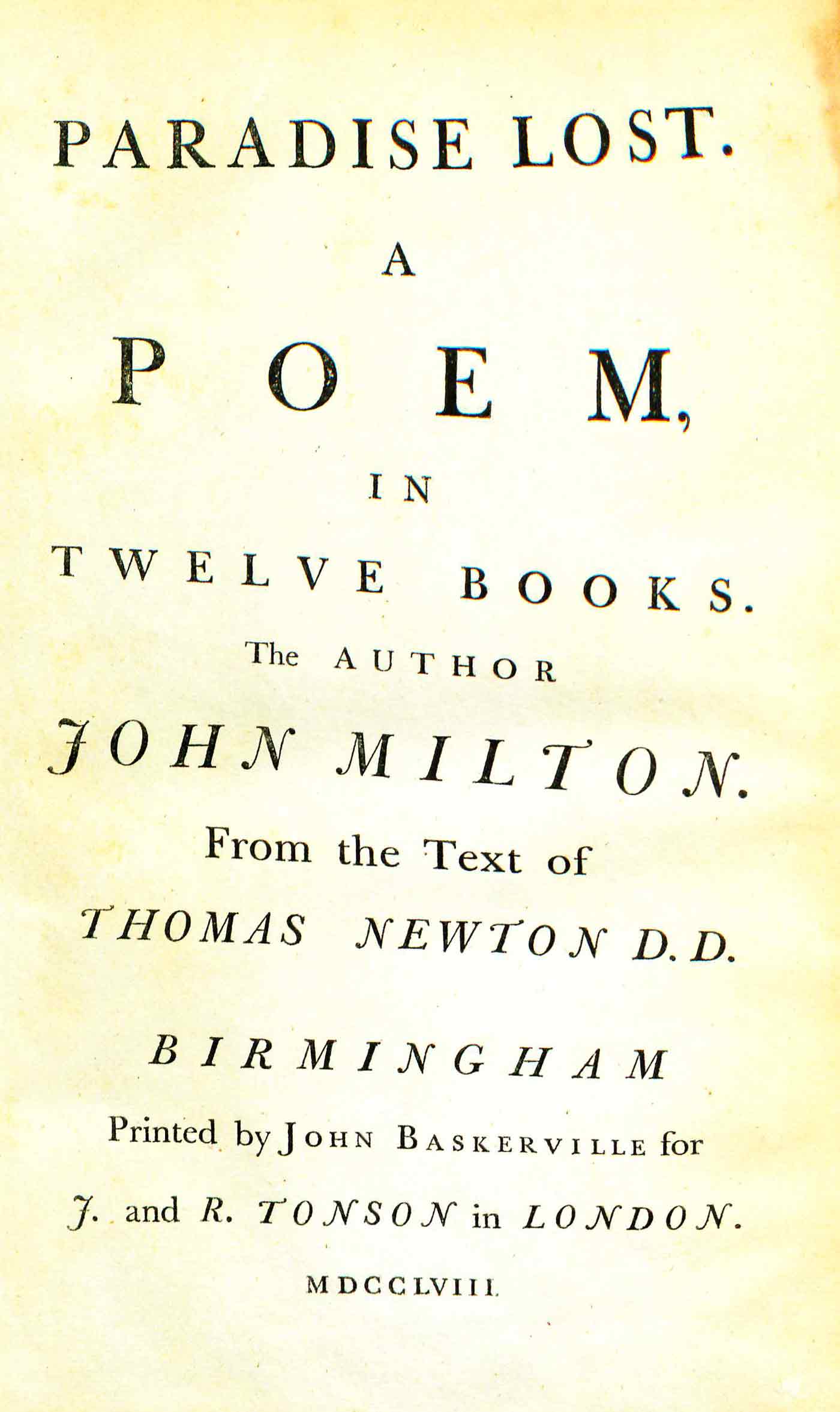Paradise Lost
by John Milton
| Paradise Lost: A Poem, in Twelve Books | |
|
Title page from Paradise Lost: A Poem, in Twelve Books, George Wythe Collection, Wolf Law Library, College of William & Mary. | |
| Author | John Milton |
| Published | Birmingham: Printed by John Baskerville for J. and R. Tonson in London |
| Date | 1758 |
| Language | English |
| Pages | [33], 416 p. |
| Desc. | 8vo (24 cm.) |
John Milton (1608-1674), was an English poet and polemicist best known for his canonical epic poem Paradise Lost.[1] In 1639, Milton published five anti-prelatical pamphlets that criticize the governance of the Church. With the dissolution of his first marriage in 1642, he began to write extensively on divorce, saying that the breakdown of a marriage should constitute grounds for divorce.[2]
Milton’s career from 1641-74 fluctuated from a focus on poetry, political and religious criticisms, and histories. Milton’s political writings from 1649-55 are marked by his disbelief of divine right of kings, his advocacy for a more republican government, and his controversial defense of regicide that made him infamous across Europe. He also wrote a formidable proposal for the reformation of the English education system[3], treatises on the importance of free press, and a treatise against the use of tithes. Milton became permanently blind in 1652[4]; he began to dictate his writing.
After the restoration of Charles II in 1660, Milton went into hiding; his books were ordered burnt and he was imprisoned in the Tower. Milton dictated Paradise Lost from around 1658-63, but was interrupted by these tumultuous incidents. His portrayal of man’s susceptibility to the evils of Satan mirrors his views of the failure of the Commonwealth and the restoration of monarchy.[5] The poem is the great English epic; more than this political allegory, the poem presents a shockingly humanized depiction of God, Satan, and Adam and Eve.
Paradise Regained was published in 1671, and depicts the “temptations of Jesus in the desert” in an unsentimental way. Samson Agonistes was published along with this work, but it is unclear when Milton wrote this drama. It is a play modeled after Greek dramas with clear autobiographical undertones[6], and a modern characterization of Samson as a man struggling to find divine influences in his life.
Evidence for Inclusion in Wythe's Library
Description of the Wolf Law Library's copy
Bound in contemporary full calf with red and brown lettering labels, gilt.
View this book in William & Mary's online catalog.
External Links
View this book in Google Books.
References
- ↑ Gordon Campbell, “Milton, John (1608–1674)”, Oxford Dictionary of National Biography (Oxford University Press, 2004), accessed September 26, 2013. All biographical details are from this source unless otherwise noted.
- ↑ W.P. Trent, “John Milton”, The Sewanee Review, 5, no. 1 (The Johns Hopkins University Press, 1897), pp. 8-9.
- ↑ Pauline Lacy Smith, “John Milton as an Educator,” ‘’Peabody Journal of Education’’, 23, no. 3 (Taylor & Francis, Ltd., Nov. 1945), p. 173.
- ↑ W.H. Wilmer, “The Blindness of Milton,” The Journal of English and Germanic Philology, 32, no. 3 (University of Illinois Press, Jul. 1993,), p. 308.
- ↑ Joan Webber, “Milton’s God,” ELH, 40, no. 4 (The Johns Hopkins University Press, 1973), p. 518.
- ↑ Smith, p. 172.
